
Westphalia is a region of northwestern Germany and one of the three historic parts of the state of North Rhine-Westphalia. It has an area of 20,210 square kilometres (7,800 sq mi) and 7.9 million inhabitants.

North Rhine-Westphalia or North-Rhine/Westphalia, commonly shortened to NRW, is a state (Land) in Western Germany. With more than 18 million inhabitants, it is the most populous state in Germany. Apart from the city-states, it is also the most densely populated state in Germany. Covering an area of 34,084 km2 (13,160 sq mi), it is the fourth-largest German state by size.
Hochsauerlandkreis is a Kreis (district) in the east of North Rhine-Westphalia, Germany. Neighboring districts are Soest, Paderborn, Höxter, Waldeck-Frankenberg, Siegen-Wittgenstein, Olpe, Märkischer Kreis.

Regierungsbezirk Detmold is one of the five Regierungsbezirke of North Rhine-Westphalia, Germany, located in the north-east of the state. It is congruent with region of Ostwestfalen-Lippe.
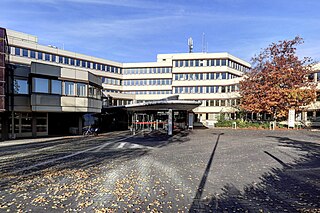
Lippe is a Kreis (district) in the east of North Rhine-Westphalia, Germany. Neighboring districts are Herford, Minden-Lübbecke, Höxter, Paderborn, Gütersloh, and district-free Bielefeld, which forms the region Ostwestfalen-Lippe.

Witten is a city with almost 100,000 inhabitants in the Ennepe-Ruhr-Kreis (district) in North Rhine-Westphalia, Germany.

Lippstadt is a town in North Rhine-Westphalia, Germany. It is the largest town within the district of Soest. Lippstadt is situated about 60 kilometres east of Dortmund, 40 kilometres south of Bielefeld and 30 kilometres west of Paderborn.

Höxter is a town in eastern North Rhine-Westphalia, Germany on the left bank of the river Weser, 52 km north of Kassel. It lies the heart of the Weser Uplands. The town itself has a population of 15,000; the district, 30,000. It is the seat of the Höxter district. Historical place names of Höxter are Hoxer and Huxaria.

Bad Lippspringe is a town in the district of Paderborn, in North Rhine-Westphalia, Germany.
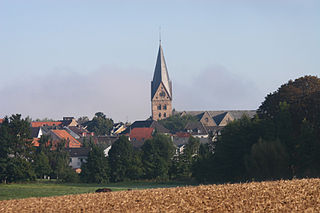
Steinheim is a town in Höxter district in North Rhine-Westphalia, Germany.
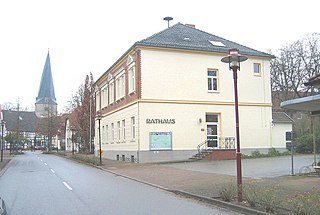
Rahden is a town in the far north of North Rhine-Westphalia between Bielefeld and Bremen and between Hanover and Osnabrück. Rahden is part of the Minden-Lübbecke District in East Westphalia-Lippe.

The coat of arms of North Rhine-Westphalia is the official coat of arms of the German state of North Rhine-Westphalia.
The politics of North Rhine-Westphalia takes place within a framework of a federal parliamentary representative democratic republic. The two main parties are the Centre-right Christian Democratic Union and the Centre-left Social Democratic Party of Germany (SPD).
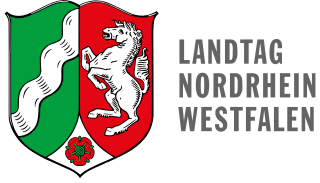
The Landtag of North Rhine-Westphalia is the state parliament (Landtag) of the German federal state of North Rhine-Westphalia, which convenes in the state capital of Düsseldorf, in the eastern part of the district of Hafen. The parliament is the central legislative body in the political system of North Rhine-Westphalia. In addition to passing of laws, its most important tasks are the election of the Minister-President of the state and the administration of the government. The current government is a coalition of the CDU and the Greens, supporting the cabinet of Minister-President Hendrik Wüst since June 2022.

SPD Nordrhein-Westfalen is a political party in German state North Rhine-Westphalia and is, with 97,300 members, the biggest state group of Social Democratic Party of Germany (SPD).
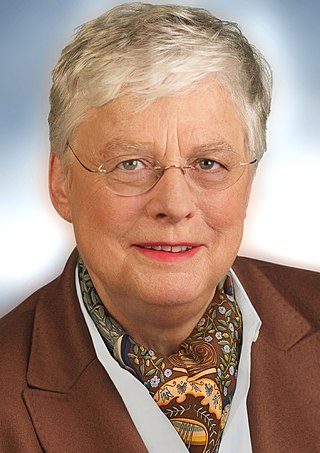
Beatrix Philipp was a German politician for the Christian Democratic Union (CDU). She initially served on the city council of Düsseldorf from 1975 to 1985 before becoming a member of the Landtag of North Rhine-Westphalia. In 1994, she was elected to the national Bundestag, serving until 2013. Outside of politics, Philipp was a headmistress.
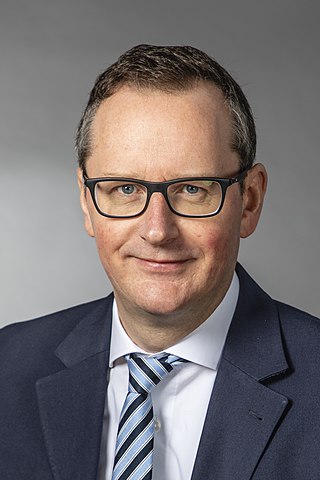
Stefan Heinrich Berger is a German economist and politician of the Christian Democratic Union (CDU) who has been serving as a Member of the European Parliament since 2019. He is part of the group of the European People's Party. Previously, he was a member of the State Parliament of North Rhine-Westphalia.
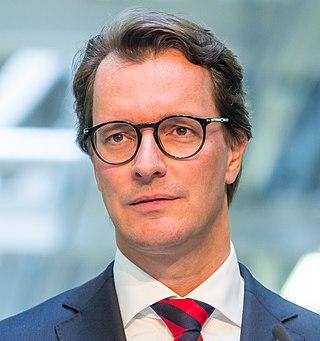
Hendrik Josef Wüst is a German politician serving as Minister-President of the state of North Rhine-Westphalia since 2021. He is a member of the Christian Democratic Union (CDU). In October 2021, he succeeded Armin Laschet as state chairman of his party. Under Wüst's leadership, his party won the highest vote share in the 2022 North Rhine-Westphalia state election.

The Minister-President of North Rhine-Westphalia, also referred to as Premier or Prime Minister, is the head of government of the German state of North Rhine-Westphalia (NRW). The position was created in 1946, when the British administration merged the Prussian province of Westphalia and the northern part of the Prussian province of the Rhine to form the state of North Rhine-Westphalia. In 1947 the state was expanded with including of the state of Lippe.

The 1947 North Rhine-Westphalia state election was held on 20 April 1947 to elect the 1st Landtag of North Rhine-Westphalia. Prior to the election, the state was governed by a parliament appointed by British occupying authorities comprising 100 members from the Rhineland and 100 from Westphalia, and later four from Lippe. The outgoing government was an all-party coalition headed by Rudolf Amelunxen.

















